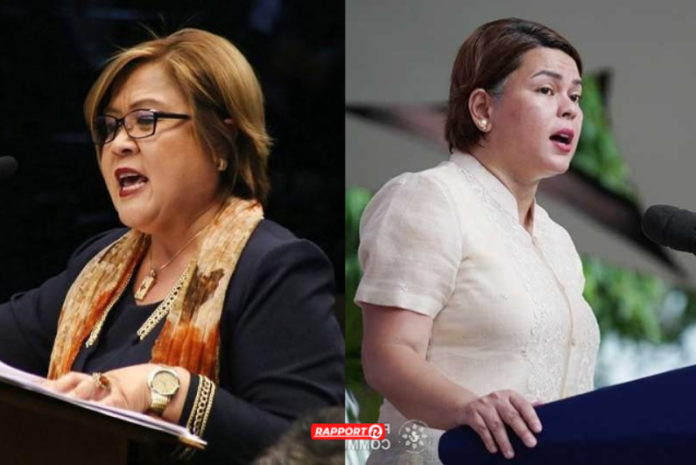Leila De Lima, a spokesman for the Liberal Party, questioned Vice President Sara Duterte’s recent assertion that she is the new face of the opposition on Thursday, characterizing her exit from the president’s Cabinet as a political ploy rather than a moral decision.
Prior to possibly running for president in the 2028 national elections, Duterte was able to separate herself from the policies of the Marcos government by resigning as secretary of the Department of Education, according to a political science specialist.
Duterte made her retirement as secretary of the Department of Education public on Wednesday. Her resignation would become effective in thirty days on July 19, the final working day before the president’s third State of the Nation Address on July 22.
During her press conference and in her letter to Malacañang, the vice president announced her retirement from the education department without providing a reason. During the 30-day transition period, DepEd and the Office of the Vice President notified the media that they would not respond to inquiries on the topic.
The same day, Duterte “has just become the leader of the opposition,” according to former presidential spokesperson Harry Roque, who also stated that her and Marcos’ UniTeam political alliance for the 2022 elections had recently been “formally dissolved.”
In response to Roque’s comments, De Lima argued that Duterte’s record lacks “accountability, transparency, and concern for the people,” which she claimed are the foundations of the “real opposition.”
“In her resignation, there was neither an acceptance of responsibility nor a change in principles and stance. How can someone who still owes accountability to the people be considered opposition?” De Lima said in Filipino.
Above all: The people are the opposition’s top priority. but the consolidation and augmentation of authority. Not supporting thousands of Filipinos being killed, not protecting a wanted religious leader. unquestionably not ignoring the mistreatment of our fishermen and the foreign occupation of our area,” the former senator continued.
According to Edcel Lagman, the president of the Liberal Party and a representative from Albay’s First District, Duterte might take on the role of leading the “partisan opposition to the Marcos Jr. administration,” while the Liberal Party would continue to serve as the “ideological and conscientious opposition to both the current administration and Duterte’s breakaway power bloc.”
Duterte’s resignation from the Marcos Cabinet, according to De Lima, is only an acknowledgement of what most people already knew: “that the ‘unity’ of the ‘UniTeam’ was only for show during elections to gain voter support.”
De Lima stated, “It’s clear that another maneuver is in progress right now.”
The vice president has been under fire lately from those who disagree with her on a number of issues, including her defense of her family’s close ally, Apollo Quiboloy, and her ongoing quiet on Chinese encroachment in the West Philippine Sea.
According to political science professor Cleve Arguelles, these recent events suggest that the Marcoses and the Dutertes will face off in the elections of 2025 and 2028, but with Marcos’ resources at Malacañang, “competition will be tough for the Dutertes.”
Arguelles, who is also the CEO of the public opinion research firm WR Numero Research, stated that the divided votes between Marcos and Duterte may also present an opportunity for the opposition due to the administration’s divisions, which have been growing since 2023 and culminated in a full-fledged verbal spat at the beginning of the year.
Before the 2028 elections, Duterte will have “more time and opportunity for a pre-campaign tour,” according to the political science expert, who also emphasized that her resignation is a benefit.
In addition, Arguelles stated, “as of yesterday, her prospective presidential campaign is no longer burdened by the uncertainty surrounding the Marcos administration.”
Duterte and Sen. Raffy Tulfo are statistically matched as the front-runners for the 2028 presidential race, according to a Pulse Asia survey conducted in April. A March poll by WR Numero indicates that Duterte is still the front-runner among Filipinos for the presidency.
Amid the political conflict between the Marcoses and the Dutertes, Arguelles warned in January that public services and initiatives intended for the country’s underprivileged people would be “hijacked” by political forces in an attempt to win over supporters.




